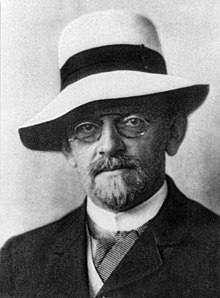Usuario:Mpagano/David Hilbert

David Hilbert (23 de enero de 1862 – 14 de febrero de 1943) fue un a German mathematician born in Wehlau, near Königsberg, Prussia (now Znamensk, near Kaliningrad, Rusia) who is recognized as one of the most influential mathematicians of the 19th and early 20th centuries. His own discoveries alone would have given him that honor, yet it was his leadership in the field of mathematics throughout his later life that distinguishes him. He held a professorship in mathematics at the University of Göttingen for most of his life.
Major contributions
[editar]Hilbert resolvió varios problemas importantes en la teoría de invariantes. El teorema de las bases de Hilbert solucionó el principal problema de la teoría de invariantes del siglo XIX, al mostrar que cualquier forma de un número de variables y de un grado dado tiene un sistema finito, pero completo, de invariantes racionales independientes y covariantes.
También unificó el campo de la teoría algebráica de números con su tratado Zahlbericht (literalmente "informe sobre los números") de 1897.
Famoso por su habilidad para hacer descubrimientos en varios campos matemáticos, Hilbert dió la primer y correcta axiomatización de la geometría euclidiana para reemplazar la axiomatización de Euclides de la geometria, en su libro de 1899 Grundlagen der Geometrie ("Foundamentos de Geometria"). Ver axiomas de Hilbert.
El puso también los fundamentos del análisis funcional al estudiar las integrales de ecuaciones y al formular una primera versión, en términos de las formas cuadráticas en infinitamente muchas variables, lo que sería llamado espacio de Hilbert. Esta obra pasó a ser en los 1920s fundamental para mecánica cuántica.
Su interés en física, en la década 1900-1910, no fue tan importante como contactos posteriores con Albert Einstein y formulaciones de relatividad general que ayudaron His interest in physics, in the decade 1900-1910, was not as important as later contacts with Albert Einstein and formulations of general relativity that helped its mathematical respectability (see also Einstein-Hilbert action).
Hilbert ayudó a sentar las bases para la teoría de autómatas, que fue después desarrollada por el científico de la computación Alan Turing.
Contribuciones, ensayos y charlas misceláneos
[editar]He put forth a most influential list of 23 unsolved problems at the International Congress of Mathematicians in Paris in 1900. This is generally reckoned the most successful and deeply considered compilation of open problems ever to be produced by an individual mathematician.
Additionally, Hilbert's work anticipated and assisted several advances in the mathematical formulation of quantum mechanics. These include his introduction of Hilbert space, and Hermann Weyl's proof of the mathematical equivalence of Werner Heisenberg's matrix mechanics and Erwin Schrödinger's wave equation.
His paradox of the Grand Hotel, a meditation on strange properties of the infinite, is often used in popular accounts of infinite cardinal numbers.
Hilbert's program
[editar]In 1920 he proposed explicitly a research project (in metamathematics, as it was then termed) that became known as Hilbert's program. He wanted mathematics to be formulated on a solid and complete logical foundation. He believed that in principle this could be done, by showing that:
- all of mathematics follows from a correctly-chosen finite system of axioms; and
- that some such axiom system is provably consistent.
There seem to have been both technical and psychological reasons why he formulated this proposal. It affirmed his dislike of what had become known as the ignorabimus, still an active issue in his time in German thought, and traced back in that formulation to Emil du Bois-Reymond.
This program is still recognisable in the most popular philosophy of mathematics, amongst working mathematicians that is, usually called formalism. For example, the Bourbaki group adopted a milk-and-water version of it as adequate to the requirements of their twin projects of (a) writing encyclopedic foundational works, and (b) supporting the axiomatic method as a research tool.
Gödel's incompleteness theorem showed, however, in 1931 that Hilbert's grand plan was impossible, as stated. The point 2 cannot in any reasonable way be combined with the point 1, as long as the axiom system is genuinely finitary.
Later years
[editar]Unfortunately for Hilbert, he lived to see the end of the great mathematical dynasty at the University of Göttingen, as the Nazis purged many of the prominent faculty members in 1933.
About a year after the purge, he attended a banquet, and was seated next to the new Minister of Education, Bernhard Rust. Rust asked, "Is it really true, Professor, that your institute suffered so much from the departure of the Jews and their friends?" Hilbert replied, "Suffered? No, Herr Minister, it didn't suffer. It simply no longer exists."
By the time Hilbert died in 1943, the Nazis had essentially gutted the university, as many of the top faculty were either Jewish or had married Jews. His funeral was attended by fewer than a dozen people, only two of whom were fellow academics.
Ver más
[editar]- Einstein-Hilbert action
- Hilbert's Nullstellensatz
- Hilbert's syzygy theorem
- Hilbert's Theorem 90
- Hilbert space
- Hilbert-Speiser theorem
- Hilbert's irreducibility theorem
- Principles of Theoretical Logic
Referencias
[editar]- Jeremy Gray, 2000, The Hilbert Challenge, ISBN 0-19-850651-1
- Constance Reid, Hilbert, ISBN 0-387-94674-8 (biography)
Enlaces Externos
[editar]- O'Connor, John J.; Robertson, Edmund F., «Mpagano/David Hilbert» (en inglés), MacTutor History of Mathematics archive, Universidad de Saint Andrews, https://mathshistory.st-andrews.ac.uk/Biographies/Hilbert/.
- Hilbert's 23 Problems Address
(en inglés)
(en inglés)
Categorías:Matemáticos de Alemania Hilbert, David
